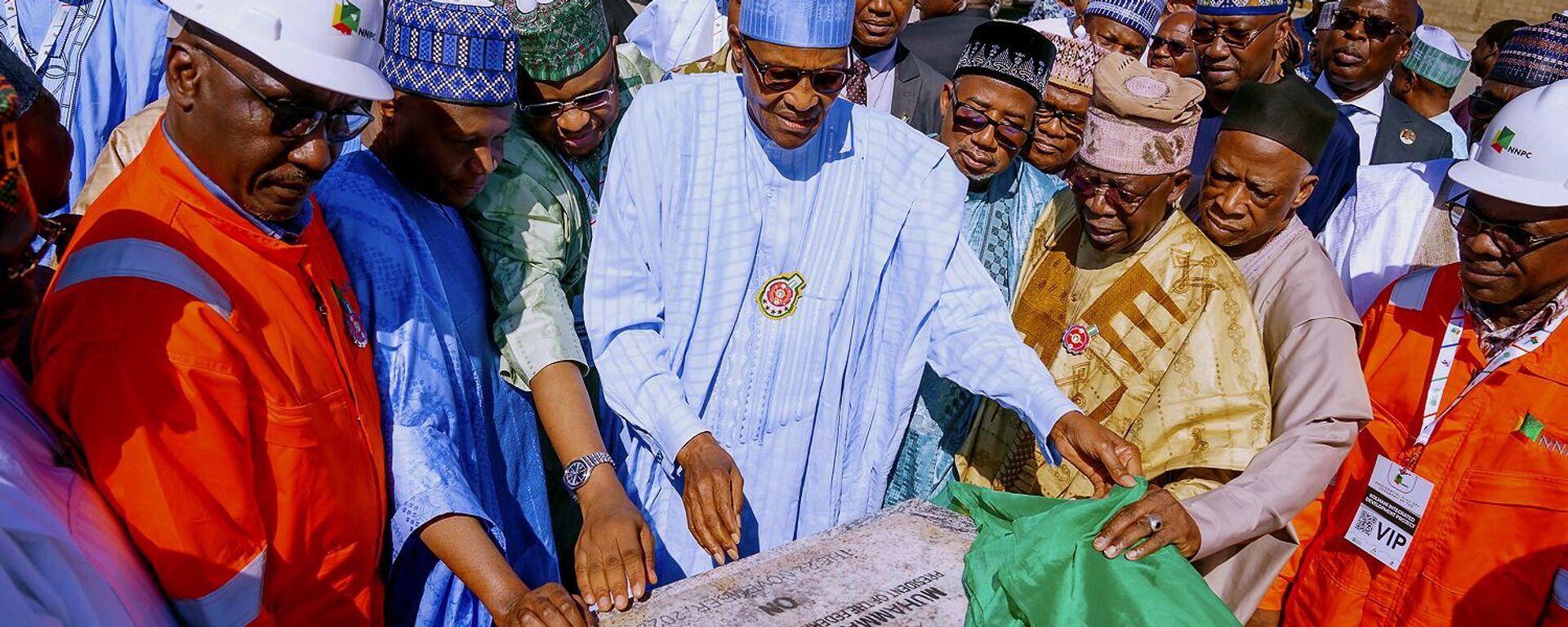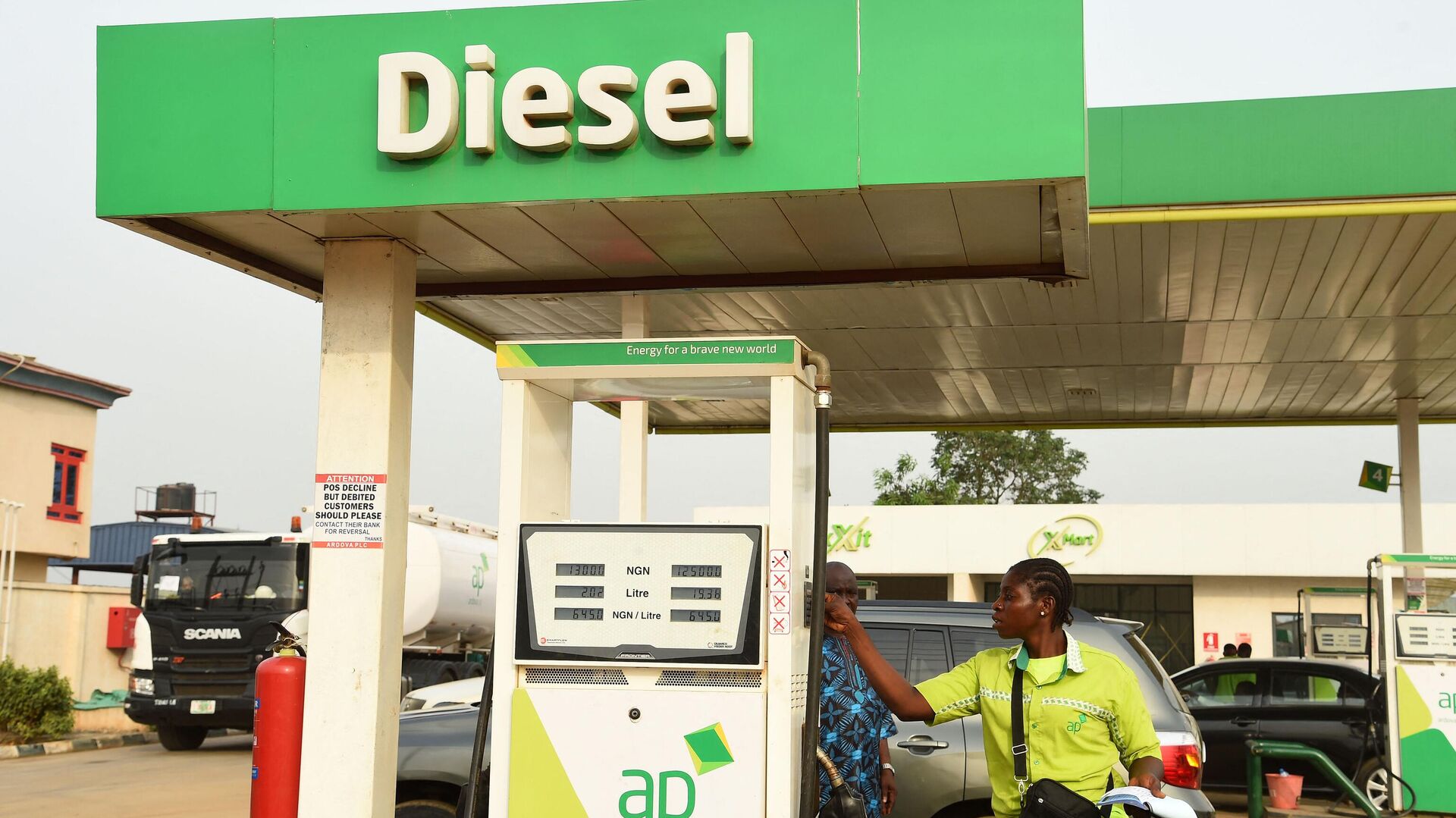https://sputnikglobe.com/20221130/nigeria-seeks-to-stop-importing-oil-products-amid-plans-to-up-refining--1104858261.html
Nigeria Seeks to Stop Importing Oil Products Amid Plans to Up Refining
Nigeria Seeks to Stop Importing Oil Products Amid Plans to Up Refining
Sputnik International
In this article you will read about Nigeria's plans to stop Importing oil products
2022-11-30T11:36+0000
2022-11-30T11:36+0000
2022-11-30T11:38+0000
africa
west africa
nigeria
oil production
oil and gas
oil refinery
self-sufficiency
import
crude oil
https://cdn1.img.sputnikglobe.com/img/07e6/0b/1e/1104859410_0:159:3076:1889_1920x0_80_0_0_e6e1fe1b9514f631886d6a1fcb66682e.jpg
Nigeria plans to stop importing oil products and become self-sufficient in oil 2023, the African country's Oil Minister Timipre Sylva said on Tuesday.According to Sylva, Port Harcourt’s refurbished refinery is expected to deliver 60,000 barrels per day of refined crude by the end of December and the refinery is being modernized at a cost of $1.5 billion.The minister stressed that the commissioning of another Dangote refinery in southwestern Nigeria is scheduled for the first quarter of next year. When completed, Dangote is expected to have the capacity to process approximately 650,000 barrels of crude oil per day. According to reports, more than $25 billion in investments have already been made to this refinery which belongs to Nigerian billionaire and business magnate Aliko Dangote.Meanwhile, Sylva stated that Nigeria's crude production had increased to approximately 1.3 million barrels per day from less than one million barrels recorded previously, and that the country hoped to meet its OPEC quota by May of next year.Oil-rich Nigeria is currently unable to process oil on its own in the necessary volumes, so it is forced to import petroleum products. The country, however, is making efforts that would allow it to abandon the expensive imports. Last week, within the framework of an integrated in-situ development project comprising upstream production, oil refining, power generation and fertilizer, the Nigerian National Petroleum Corporation (NNPC) started drilling oil and gas in the country's north. This project, according to the country's politicians, is also an important step toward eliminating petroleum product imports in the near future.While the African country is working on its plan to eliminate oil products import, its energy system is currently facing other challenges as well. Nigeria's existing power plants are struggling to meet the country's 225 million people's demand for electricity, forcing many citizens to rely on diesel generators. According to the Nigerian Electricity Regulatory Commission, Nigeria's power grid has experienced more than 200 partial and total failures over the last twelve years.
https://sputnikglobe.com/20221124/nigeria-starts-drilling-for-oil--gas-in-countrys-north-for-first-time-1104625867.html
africa
west africa
nigeria
Sputnik International
feedback@sputniknews.com
+74956456601
MIA „Rossiya Segodnya“
2022
News
en_EN
Sputnik International
feedback@sputniknews.com
+74956456601
MIA „Rossiya Segodnya“
Sputnik International
feedback@sputniknews.com
+74956456601
MIA „Rossiya Segodnya“
nigeria's oil import, refineries in nigeria, nigeria's oil, former largest oil producer, energy in nigeria
nigeria's oil import, refineries in nigeria, nigeria's oil, former largest oil producer, energy in nigeria
Nigeria Seeks to Stop Importing Oil Products Amid Plans to Up Refining
11:36 GMT 30.11.2022 (Updated: 11:38 GMT 30.11.2022) Abuja lost its position as Africa's largest oil producer in 2022. Experts attribute this to the fraudulent activities of stealing crude oil and destroying pipelines. This year alone, the government has spent more than $28 million protecting its pipelines.
Nigeria plans to stop importing oil products and
become self-sufficient in oil 2023, the African country's Oil Minister Timipre Sylva said on Tuesday.
"We're expecting that we will actually be exiting the importation of petroleum products from maybe about the third quarter next year if I was to give it a longer timeframe, but I believe that even before the third quarter next year," Sylva said.
According to Sylva, Port Harcourt’s refurbished refinery is expected to deliver 60,000 barrels per day of refined crude by the end of December and the refinery is being modernized at a cost of $1.5 billion.
The minister
stressed that the commissioning of another Dangote refinery in southwestern Nigeria is scheduled for the first quarter of next year. When completed, Dangote is expected to have the capacity to process approximately 650,000 barrels of crude oil per day. According to reports, more than $25 billion in investments have already been made to this refinery which belongs to Nigerian billionaire and business magnate Aliko Dangote.
Meanwhile, Sylva stated that Nigeria's crude production had increased to approximately 1.3 million barrels per day from less than one million barrels recorded previously, and that the country hoped to meet its OPEC quota by May of next year.
Oil-rich Nigeria is currently unable to process oil on its own in the necessary volumes, so it is forced to import petroleum products. The country, however, is
making efforts that would allow it to abandon the expensive imports.
Last week, within the framework of an integrated in-situ development project comprising upstream production, oil refining, power generation and fertilizer, the Nigerian National Petroleum Corporation (NNPC) started drilling oil and gas in the country's north. This project, according to the country's politicians, is also an important step toward eliminating petroleum product imports in the near future.

24 November 2022, 10:39 GMT
While the African country is working on its plan to
eliminate oil products import, its energy system is currently facing other challenges as well.
Nigeria's existing power plants are struggling to meet the country's 225 million people's demand for electricity, forcing many citizens to rely on diesel generators. According to the Nigerian Electricity Regulatory Commission, Nigeria's power grid has
experienced more than 200 partial and total failures over the last twelve years.



